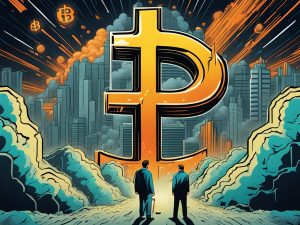Understanding the Legal Challenges Facing Do Kwon: A Comprehensive Analysis 📉⚖️
The legal landscape for Do Kwon, the co-founder of Terraform Labs, is increasingly complex as recent developments reveal the extent of the damage caused by the collapse of the Terra ecosystem. This year, U.S. prosecutors estimate that Kwon may have defrauded over one million individuals, signaling a significant impact on the cryptocurrency market and investors alike. As the case unfolds in a New York court, important considerations regarding victims’ rights emerge, alongside high-stakes legal ramifications for Kwon himself.
The Extent of Alleged Victimization: Over 1 Million Affected 👥🌍
In a recent court session, the prosecution outlined their case against Kwon, underscoring the staggering number of potential victims. The government, represented by acting U.S. attorney Daniel Gitner, proposed a motion to inform victims of their rights under the Justice for All Act of 2004. Given the sheer volume of individuals affected, traditional methods of notification were deemed unsuitable—an effort to contact each victim through direct mail or phone would demand enormous resources and time.
- The government suggests using public notices and dedicated online platforms as more effective alternatives for victim communication.
- Date updates and case information will be accessible through an official website, ensuring that those affected remain informed throughout the legal process.
Justice for All Act and Victim Rights: A Framework for Recovery 📜⚖️
The Justice for All Act of 2004 strengthened the rights of crime victims, establishing a framework for timely notifications and involvement in public legal proceedings. Victims of the Terraform incident are entitled to various rights, including:
- Protection from the accused to minimize intimidation during the legal process.
- The right to consult with the prosecuting attorney for guidance on their involvement.
- Access to restitution and informed participation in hearings surrounding sentencing or parole.
Under Section 3771, victims can submit written statements to the court and attend public hearings. Importantly, even in cases with large groups of victims, amendments allow courts to adopt alternative methods for updates and communications.
The Catastrophic Collapse of Terraform Labs: Background and Impact 📉💔
The collapse of Terraform Labs in 2022 served as a watershed moment, wiping out more than $40 billion in investor assets. The fallout was severe, with numerous crypto hedge funds facing bankruptcy, prompting a sharper look from regulators at cryptocurrency practices.
- Terraform Labs’ innovative blockchain solutions and algorithmic stablecoin, TerraUSD, were initially touted as game-changers for decentralized finance.
- However, allegations claim that Kwon misled investors about the stability and technological integrity of these offerings, contributing to widespread loss.
Ongoing Legal Proceedings: Do Kwon’s Battle Against Numerous Charges ⚖️🕵️♂️
Kwon’s legal entanglements span multiple jurisdictions as he faces nine felony counts in New York. These charges stem from allegations of fraud tied to the notorious collapse of TerraUSD. The defendant was extradited to the United States in late December 2024 following a previous arrest in Montenegro for unrelated matters.
Recent reports suggest that Kwon could face a lengthy prison sentence, up to 130 years, should he be found guilty of the multitude of charges. This year has seen significant media attention surrounding the case as Kwon pleads not guilty, disputing the allegations of fraud related to Terra’s demise.
As the court proceedings unfold, the ramifications of Kwon’s actions continue to ripple throughout the cryptocurrency landscape. Investors and stakeholders eagerly watch how the case will resolve and what measures will be taken to compensate those affected by the collapse.
Hot Take: The Ripples of Responsibility ⚡️📉
This case represents a pivotal moment not only for Kwon and Terraform Labs but also for the broader cryptocurrency community. As regulations tighten and legal standards evolve, the importance of transparency and accountability becomes increasingly evident. The developments around this case may very well set precedents for how similar instances are handled in the future, influencing the trajectory of the crypto industry as a whole.
In conclusion, Kwon’s legal situation shines a light on the need for clear guidelines and protective measures within the realm of digital finance, ensuring that investor rights are upheld amidst the evolving landscape of cryptocurrency.





 By
By
 By
By
 By
By
 By
By

 By
By